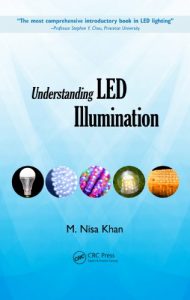Understanding LED Illumination elucidates the science of lighting for light emitting diodes. It presents concepts, theory, simulations, and new design techniques that shine the spotlight on illumination, energy efficiency, and reducing electrical power consumption. The text provides an introduction to the fundamentals of LED lamp design, and highlights the principles of large-space and 3D object illumination for developing competitive LED lamps.
The first part of the book discusses lamp output metrics and characterization methods, while the second part of the book explores certain retail and prototype lamp comparisons with theory, simulations and experiments It details the light propagation and distribution characteristics of LED light sources for general illumination applications, and presents design and simulation requirements for LED lamps suited for real-world applications. It also addresses light generation, efficiency, theoretical limits, efficiency limiting factors, and LED lamp design elements.
- Emphasizes the lighting aspects for LED lamps: quality and improvement
- Describes the basics of junction diode and the intricacies of compound semiconductor optoelectronic properties including the thermal, electrical, optical, and mechanical aspects
- Explains the challenges of LED lighting in scientific and mathematical terms
- Includes case studies from Osram Optosemiconductors, Sylvania, and Phillips, GE, and others
The book characterizes several LED replacement lamps for household and commercial lighting and discusses a novel design for improving tubular LED replacements. It takes the mysteries out of solid-state lighting for lighting designers, and helps LED scientists and engineers effectively design their products to provide high-quality illumination.






